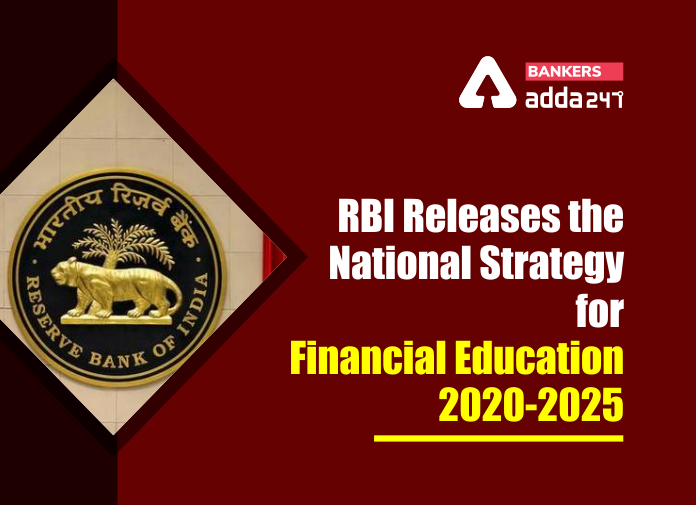RBI: The Reserve Bank of India has released the National Strategy for Financial Education for the time period of 2020-2025 with the perspective of “Creating a financially Aware and Empowered India”. The NSFE has been implemented through the institutional mechanism and it would be directly monitored by Technical Group of Financial Inclusion and Financial Literacy. The Financial Stability and Development council would be overseeing the Strategical implementation.
National Strategy for Financial Education: 2020-2025 – Download PDF
What are the objectives of National Strategy for Financial Education: 2020-2025?
The RBI has also released the revised strategic objectives that would be reflecting the alteration to economic landscape and promote financial education throughout the nation. Below are the revised objectives in new National Strategy:
- Inculcate financial literacy concepts among the various sections of the population through financial education to make it an important life skill
- Improve research and evaluation methods to assess progress in financial education
- Encourage participation in financial markets to meet financial goals and objectives
- Improve usage of digital financial services in a safe and secure manner
- Develop credit discipline and encourage availing credit from formal financial institutions as per requirement
- Encourage active savings behavior
- Manage risk at various life stages through relevant and suitable insurance cover
- Plan for old age and retirement through coverage of suitable pension products
- Knowledge about rights, duties and avenues for grievance redressal
Also read, RBI Grade B 2020: Notification, Exam Date, Application Form, Eligibility, Syllabus
Key Stakeholders in the National Strategy:
Below is the list of the stakeholders who have been identified for implementing strategic goals to the Financial Education in 2020-2025.
- Government of India: Department of Financial Services (Ministry of Finance), Ministry of Electronics and Information Technology, Ministry of Rural Development/ National Rural Livelihood Mission, Ministry of Urban Affairs and Poverty Alleviation/ National Urban Livelihood Mission, Ministry of Human Resources Development, Ministry of Corporate Affairs, Ministry of Skill Development and Entrepreneurship, Ministry of Health and Family Welfare, Ministry of Women and Child Development, Ministry of Information and Broadcasting, Ministry of Panchayati Raj, Ministry of Social Justice and Empowerment
- Financial Sector Regulators: RBI, SEBI, IRDAI and PFRDA
- National Centre for Financial Education (NCFE)
- Development Financial Institutions: NABARD and SIDBI
- Industry Associations: IBA, AMFI, FEDAI, BCFI
- Securities Market Institutions Infrastructure: Stock Exchanges, Depositories
- Payment Institutions: NPCI
- Investor Education Institutions: IEPFA, IICA, etc
- Financial Service Providers: Banks, Insurance Companies, Mutual Fund Companies, Pension Funds, Stock Exchanges and Depositories, Non-Banking Financial Companies, Fin-tech companies, etc
- Self-Regulatory Organizations (SROs): FIDC, M-Fin, Sa-Dhan, etc
- State Rural Livelihood Mission (SRLM) of all states
- NGOs/ Civil Society Organizations
- Research Institutions
- Consumer Associations
- Multi-Lateral Institutions (OECD-INFE, G20, etc.): For knowledge sharing on Global Best Practices
| RBI Grade B 2020 | RBI Assistant 2020 | IBPS PO 2020 | IBPS Clerk 2020 |
Evaluation of the National Strategy:
As evaluation is mandatory to check on whether the strategies are implemented correctly or not, it has been decided that a Mid-term Evaluation shall be undertaken at the end of three years of Strategy implementation (2022-2023). A comprehensive National Survey at the end of the Strategy implementation period shall be undertaken in 2025 and will be presented for the changes made in these five years
Progress made under 1st National Strategy for Financial Education (2013-2018):
The key elements of the previous strategy for financial eduction was also summarized along with the newer strategies. From the previous strategy, the key learnings are as such:
- Target Specific modules must be developed
- The language and mode of delivery of financial literacy messages should be quiet appealing
- One-to-one learning and group training were found to be effective modes of dissemination of financial literacy messages
- Practical training should be in more focus
- Broadcasting through television was highly responsive.
- Stakeholder collaborations is important
- Financial literacy examples are more effective when co-related with life-events
- More efforts are needed to understand how financial education program can be curated to translate into positive behavioral outcomes
Click Here to Register for Bank Exams 2020 Preparation Material




 Daily Current Affairs 18th July 2025, Im...
Daily Current Affairs 18th July 2025, Im...
 Daily Current Affairs 17th July 2025, Im...
Daily Current Affairs 17th July 2025, Im...
 Daily Current Affairs 16th July 2025, Im...
Daily Current Affairs 16th July 2025, Im...


